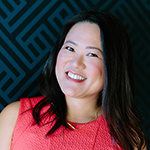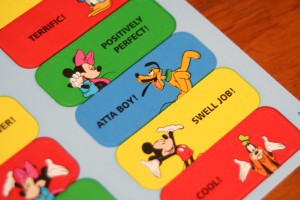At Back to School Night, I noticed my second grader’s name tag was not where it used to be. His new seat was front and center, next to the overhead projector. “Because we know he won’t mess with the cord,” the teacher confided.
“Don’t be so sure,” I joked.
“Oh, he won’t.” She seemed certain. You see, my seven year-old has already gotten a reputation as a Good Boy. Which is usually a good thing: it comes with positive reinforcement, citizenship awards, and privileges not granted to more troublesome students.
This is where I take a deep breath, and hope this is not one of those cases where “be care what you wish for” but… okay, here goes.
Sometimes, I don’t want my kid to be so good. In fact, he isn’t always “good”, like when he’s picking on his brother, refusing to eat vegetables or do homework, or throwing a temper tantrum over having to wear sunscreen. Notice all these instances happen to take place at home — or at least on my watch.
My son is a classic case of Jekyll and Hyde: the kid who is on best behavior at school… and just an ordinary, onery, ansty boy at home. Some parents would just breathe a sigh of relief here, and be thankful that the problems are hidden away, the embarassing scenes are relatively private, and be happy that their kid doesn’t get sent to the Principal’s office.
But me, no. I worry that my child:
1) has such a deep-seated fear of authority that he is afraid to overstep any limits at school. So much that he probably stifles his natural curiosity and uniqueness in an effort to fit in and stay below the radar. I worry that he will bejust another follower, robbed of innovation and the ability to think out of the box or stand up for himself.
or…
2) has been so cheaply won over by stickers and reward charts that he’s going to become some Eddie Haskell sycophant yes-man who smiles and goes along with anyone who offers any kind of positive reinforcement, all the while seething with resentment and misplaced rebellion.
Okay, you may think those are worst case scenarios. Or maybe (especially if you’re Asian) you’re thinking, “Hey that’s the way I feel!” I am cognizant of the fact that I come from what Malcolm Gladwell in Outliers refers to as a high Power Distance Index culture (that is, a high degree of respect for authority). Although I am not Korean or Colombian, like the assistant airline pilots whose deferential avoidance of direct conflict with their superiors was attributed to high rates of plane crashes, I do come from an Asian background which places a much greater emphasis on respect to authority — particularly teachers — than American culture does. I have to ask myself: have I pressured him to be an obedient (I hate that word) student at school? And does he then release all his pent-up energy and defiance at home — aimed at me? Add to that mix that he is a first-born, classic parent pleaser.
Perhaps he just knows what he can get away with. That mom is a softie, unlike the teachers at school. Or , does he simply feel more safe in a family situation that he can act his true self, no filter necessary, where he feels so secure in his acceptance that he has no fear of repercussion? Maybe it’s just that after a day of holding it together in class, he simply needs to cut loose and let it all hang out.
In a moment of frustration with my son, I ask him, “Would you act this way at school?”
His answer is simple: “No.”
“Why?”
“Because it’s not allowed.”
Sigh. What do you think? Is he behaving out of fear and pressure? Or perhaps he as actually internalized some values of positive social behavior?
Maybe I should just count my blessings. Because I do have another son — a stereotypical youngest child — who is starting Pre-K soon…


As a parent of two grown sons who also fit that Jekyll/Hyde mold back in the day, I think there is probably a strong element of needing to cut loose after school. After all, they do have that whole y-chromosome thing going on! But I also think that your boy may have more empathy for his classmates than you realize yet. He will instinctively understand that they deserve teacher time and the right to focus on their tasks as much as he does. That whole “they do as you do, not as you say” thing is so very true! And your two are blessed to have two cultural outlooks to learn from. Firstborn is always the Experimental Child anyway!
Thanks for sharing, Grace. Unfortunately, I find that *I’m* the Jekyll and Hyde of our family – My kids often see me as the frustrated and impatient mom and then turn around and be the nicest person when I’m interacting with someone else. I’m painfully aware that they’re learning from what I do, not what I say. For now, I hope that through my honesty about my own flaws and weaknesses that I can show them my own need for God…
I don’t think it is either nature or nurture Grace, I think both come into play. Cameron has his share of issues, but he really wants to please school authority. Um, except for me and Scott. Maybe some of its a boy thing? Maybe its because Scott and Steve are brothers and impart something similar to their sons? I do know so many people whose kids are angels at school/preschool/daycare and then fall apart at home. So while there is something true to the Jekyll/Hyde mold, you can’t blame yourself!
Maybe it is human nature to treat those we KNOW love us unconditionally worse than those we are unsure of (like a new teacher) and are trying to please. We say things to family we’d never think of saying to friends. Plus, our kids know us so well by now…they know what they can get away with!!!
Interesting article.
Maybe Mr Hyde is a sensitive type? I just finished Elaine Aron’s Highly Sensitive Child. She has an interesting take on on whether a child can be “too good.” Basically, she says the temperament is hardwired, but we, as parents, can help our children thrive. Like helping them get over the fear of public failure or maybe just acknowledging that our child might see/feel/taste something that we don’t.
You also got me thinking about how the Gladwell’s Power Distance thing comes across for Asian-American cultures. No matter the culture, immigrants are the ones who are willing to leave everything behind to start a life in a strange new place (though Asians usually came on an academic visa). I wonder how that changes the cultural equation.
I am a teenage girl and must admit I was exactly like this when I was younger. I was the honor student and the perfect example of obedience at school, but when I got home I’d turn from sweet, SHY little angel into this loud and often insensitive Dr. Hyde. It’s wearing away with age as I have become more aware of the expectations of young ladies in society and am becoming in general a better person, but as a child I fell into the rabbit hole in more ways than one. I’m sure your son and other kids who act like this will be fine. I do have OCD, though, and am consistently afraid of how others might perceive me (not and never to the point where I grovel at their feet, of course).
xx
Luna
Thanks for chiming in, Luna. I was that kind of child, too, so I guess I shouldn’t be surprised if my kids have a similar personality. Sounds like you are figuring out your way just fine ;)